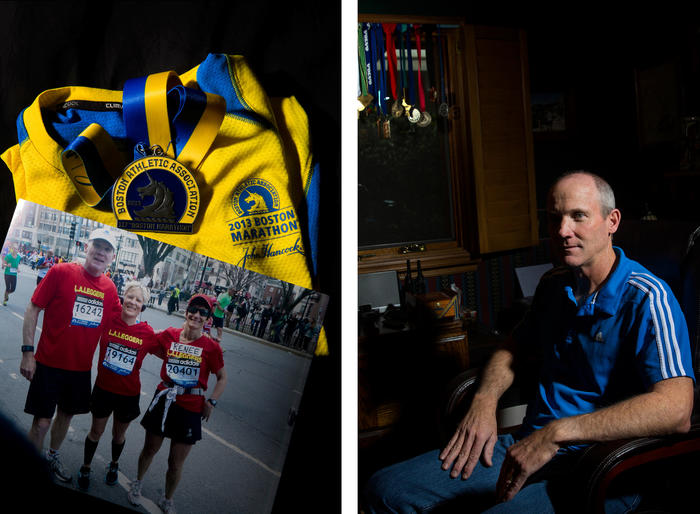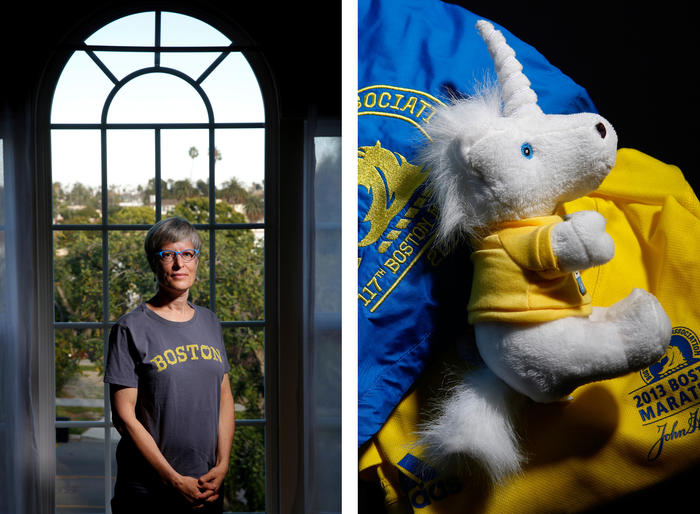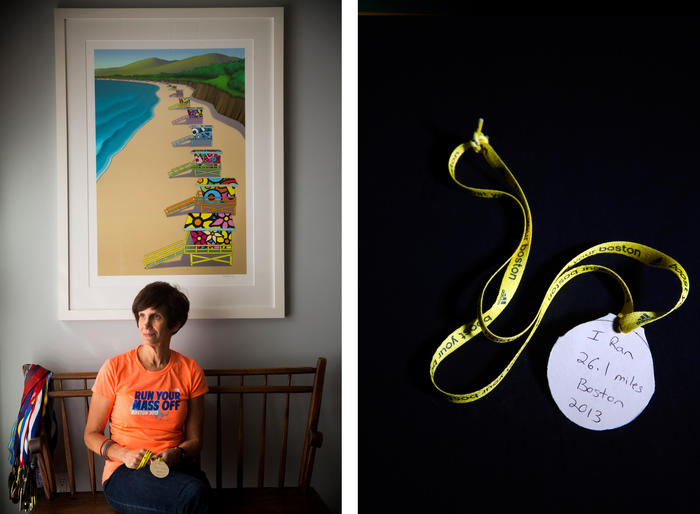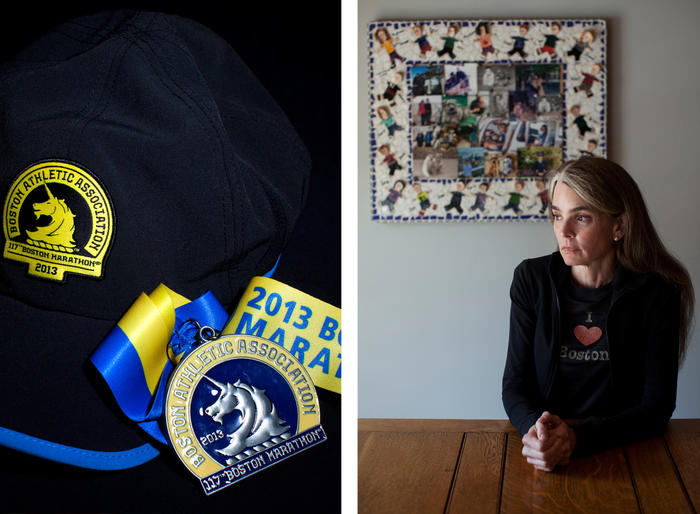Six L.A. runners reflect on their return to the Boston Marathon
By Nathan Fenno, Photography by Jay L. Clendenin
They were close to the finish line or had already crossed it when two bombs ripped through the crowd last year, killing three people and injuring more than 260. Now six Los Angeles-area runners are returning to Boston to finish something bigger than a race.
Phil Kent, 57
Running made Phil Kent feel better, even if the pancreatic cancer diagnosed Dec. 10, 2012, transformed a mile loop around his neighborhood into an ordeal. Three months of chemotherapy stripped every hair from his body and brought diarrhea, mouth sores, rashes, vomiting. Some days it felt as if the cancer had knocked him down as a dark sky closed in.
The drugs seemed to shred the aerospace engineer's body that once climbed mountains and ran 10 miles without thinking twice. So, Kent forced himself to go outside and exercise when the chemotherapy's side effects left him wanting to curl up into a ball.
“His doctor tried to slow [Kent] down and he didn't want to slow down,” said Sharon Kent, his wife of 33 years.
Ten days before the cancer surgery to remove part of his pancreas that would leave a 17-inch incision in his abdomen, Kent jogged down Boylston Street and prepared to finish his third Boston Marathon. Sure, each mile took three or four minutes longer than normal. But a monthlong break from chemotherapy and the determination not to pay heed to his doctor's concern pulled him along.
Marathoners are different, the 57-year-old Kent believed. They push. They drive. They go.
A white baseball cap covered his bald head. He didn't advertise the cancer. Kent didn't want people to feel sorry for him. But Jennifer Hartman and Renee Opell, longtime friends from the L.A. Leggers running club, knew the story. They stuck with him through the course. They stopped just once, 25 miles in, so Sharon Kent could snap their picture and kiss her husband.
The three runners grabbed each other's hands as they passed the Lenox Hotel. They planned to raise their arms as they crossed the finish line.
Then the first pressure cooker, jammed with bits of metal, exploded in front of them on the opposite side of the street.
They stopped. The concussion pulsed through Kent's chest and ears. Chunks of concrete showered onto spectators. He figured a gas line ruptured.
Twelve seconds later, the second bomb tore into the crowd behind them.
Kent struggled with those seconds in the last year. Had he been alone, he'd have dashed over the finish line. Maybe he could've helped carry the injured to the medical tent. But the trio froze. When the second bomb went off, spectators broke down barricades and invaded the course. There wasn't any way to push forward.
The three friends will try to finish what they started last year.
“I don't know if we're going to be able to hang together,” Kent said. “I hope so.
Two days before Thanksgiving, he finished chemotherapy and in February doctors declared the cancer to be in remission.
“Talk about a miracle,” he said.
Jennifer Hartman, 47
As Jennifer Hartman and her friends shrugged off fatigue in the Boston Marathon's final block, she corralled them into position for a photo when they crossed the finish line. They slowed. Phil Kent had to be in the middle, Renee Opell on one side, Hartman on the other. They'd raise their arms. They'd be together.
An explosion in front of them left the women digging their fingernails into Kent's arms. They stopped on the right side of Boylston Street.
Until 2:49 p.m., Hartman found the day filled with beauty. No cramps. No one hit a wall. And 13 miles into the race, she shared a secret with her two friends. Approaching 48 years old, the Los Angeles financial advisor planned to get pregnant.
At the moment, all that seemed far away. Hartman thought terrorists had attacked a nearby subway station.
“I immediately knew people had probably died,” she said.
Hartman's analytical side kicked in. She noted panic. She didn't see blood. She wanted to protect her friends. The initial inclination to dart over the finish line, obscured by smoke for a moment, turned into the determination to flee in the opposite direction of the noise.
As Hartman turned away from the finish, the second bomb detonated. She wondered when the third explosion would hit. A photo captured the instant. Amid a sea of runners and police officers and race officials, the red-shirted trio is frozen. Haze from the first bomb lingers. Dirty smoke from the second billows behind them.
“It's almost hard to believe that's really us there,” Hartman said.
Originally, she hadn't planned to run Boston this year. The bombs changed that. Because her first child is due Oct. 3, Hartman will probably run only 18 or so of the 26.2 miles.
“I really do want to finish,” Hartman said. “Just to do it to show everybody that we're all strong and coming back.”
Renee Opell, 52
The photo lingers in Renee Opell's mind.
Three runners in red shirts and black shorts paused for 10 or 15 seconds. Just 1.2 miles of the Boston Marathon remained. But the friends put their arms around each other and grinned as they froze for a photo. Opell is on the left, almost pulling Jennifer Hartman and Phil Kent toward the rest of the race. Opell didn't want to stop and chat. The 52-year-old Studio City resident wanted to finish.
"That's the picture that kept us from crossing the finish line," she said.
As the finish came into sight, the first explosion ripped through the crowd in front of them. Did a gas main blow up? They froze again. But for the photo, they would've been next to the smoke and shrapnel.
Twelve seconds later, the second bomb exploded behind them.
For an instant, Opell believed the friends should push through the bedlam and finish. Not even a minute's jog separated them from the line's blue-and-yellow strip across the blacktop. It's right there, Opell thought.
Fans streamed out of the bleachers along the street. Runners stood still or turned around. Police officers seemed to sprint in every direction. Bill Iffrig, the 78-year-old marathoner whose photo would be on the cover of Sports Illustrated, lay on the pavement 20 yards in front of them.
They decided to duck down a side street before the situation further deteriorated.
Opell cried as they left.
“I was so disappointed not to have been able to finish and at who would want to try to ruin this race and this whole sport,” she said. “Right away, I was in shock.”
Running keeps the project manager at a debit card company sane and happy. She's completed 44 marathons since her first crack at the L.A. Marathon as a birthday goal in 2001. After Boston, though, sudden noises bother the 51-year-old. Like when she jumped the first time watching television coverage of the bombing and heard explosions she knew were coming. Like the men dressed as pirates shooting toy guns at each other as she ran the Portland Marathon in October.
That day in Boston lives in smaller gestures. In the hours after the bombing, Hartman made Opell a medal. The circle of yellow paper hangs from a yellow shoelace.
“I ran 26.1 miles in Boston 2013,” the inscription in black marker reads.
Opell's voice carries an edge when she talks about finishing later this month. Not if or maybe. But when.
“I'll probably be hysterically crying in a good way,” she said. “But that's just me.”
Kerri McKay, 39
The finish line floated in front of Kerri McKay, 100 or so yards down the Boylston Street blacktop.
The Santa Monica clothing designer couldn't wait for her first Boston Marathon to be over. Blisters on both feet prompted a stop at a medical tent 15 miles into the race. The pace wasn't what she wanted. McKay never expected to even qualify for the race when she took up the sport in 2010. But she could see the end.
A belch of smoke and noise took McKay's mind off the finish line. A backfire? Twelve seconds later, another explosion.
Almost four hours of exertion had left McKay near delirious. She didn't know what to make of the commotion. Screams replaced cheers. People ran in all directions. A Boston police officer in a neon yellow vest told her to turn around and run as fast as she could.
"'Are you kidding me?'" McKay remembered thinking. "I've just run all this way and now you're telling me to run in the opposite direction?"
There wasn't any choice. She could flee or be trampled by the confused mass of competitors and spectators trying to escape danger no one seemed to understand.
Her then-boyfriend, now fiance, Brian O'Neill, and coach, Adrian Valdivieso, were supposed to be near the finish line. Were they OK?
Away from the chaos, a stranger offered McKay their coat and cellphone. At the Sheraton Hotel a couple of blocks off Boylston Street, she reunited with O'Neill, stuck on a subway when the bombs exploded, and Valdivieso. Hotel staffers handed out bathrobes and towels and blankets and food to marathoners seeking refuge. A woman offered to let McKay use her room. The reality of the unfinished race started to cut through the shock.
"I could've lost a lot of people I love that day," McKay said.
She isn't the sort who pounds out a marathon each week. The training saps her, mentally and emotionally and physically. McKay hasn't run a full marathon since Boston. The finish lines at a couple of half marathons, though, looked different. The lines brought back that awful day.
McKay never doubted returning. Defiance creeps into her voice as she talks about the opportunity to finish being ripped away. She remembers the fear and trauma and tears, but, most of all, the kindness of stranger after stranger remains.
The 39-year-old will marry O'Neill later this year. First, though, she wants to cross the finish line.
Julie Hardin, 51
Two blocks after Julie Hardin finished the Boston Marathon, the ground seemed to move. A noise rumbled through the streets that the Encino runner thought sounded like a sonic boom. Smoke rose from near the finish line.
The ground buckled again, accompanied by the same boom.
Adrenaline surged through the Encino mother and washed away the fatigue from almost four hours of winding through the marathon's 26.2-mile course. Hardin hadn't even downed her usual post-race milkshake, but every detail seemed so clear. The sky. The streets. The crowd.
She had to escape.
Four years ago, Hardin took up marathons after dabbling in shorter races. The distance forced other thoughts out of her mind to concentrate on finishing.
“It's one of the only opportunities as an adult you have to really feel free and unencumbered by all this stress,” she said. “As an adult, there are very few opportunities where you can earn a medal for something. It gives you that great joy of being a kid again. You can't go and buy it. You have to earn it.”
When Hardin, 51, finished her first Boston Marathon in 2011, she pinched herself. The accomplishment -- she calls it a mini-Olympics for amateur runners -- didn't seem real.
Last year's race felt seamless to Hardin. Like a celebration. Fourteen miles in, kids bounced on trampolines along the course as “Gangnam Style” blared. People lined the streets to cook out and drink and cheer. The noise grew so intense that Hardin couldn't converse with a fellow runner while heading up Heartbreak Hill some 20 miles in.
“Everybody's standing out there shouting like you're the best runner they've seen all day long,” she said.
The bombs' impact, however, lingered long after the race finished.
Post-race crowds after big events bother Hardin. She worries about other runners, worries about spectators, worries about herself. Barricades after the finish of February's San Francisco Half-Marathon reminded her of Boston.
“There were so many people and no way to get out,” she said.
That never dimmed her resolve to return to Boston. Less than 24 hours after the bombing, she knew she had to run there again. Hardin never thought of herself as the sort who'd react to tragedy with such defiance. But she doesn't want the bombers to win. She wants to reclaim the day. She has to go.
Max Esquivel, 48


Forty-nine minutes after Max Esquivel finished the Boston Marathon, he stood next to the window at his hotel a five-minute walk from the finish. The Pasadena man posted his time on Facebook -- 3 hours, 14 minutes, 42 seconds -- and responded to congratulatory messages off the last race he expected to run in Boston for years. Instead, he planned to focus on ultra-marathons.
The window rattled. An explosion? Or did the noise come from passing construction equipment?
Another sound shook the window.
Within minutes a friend posted on Facebook about a bomb. The congratulations turned into questions about his safety.
Esquivel, who owns a small business and is training for the 100-mile Angeles Crest endurance run, struggles to comprehend what happened.
“It's hard to go from celebration to just a place of sorrow,” he said. “It's really impacting emotionally. It's hard to explain.”
He added: “I think I'm still trying to understand what happened.”
The 48-year-old took up distance running in 2005 to fulfill a birthday promise to himself to run the L.A. Marathon. When Esquivel crossed the finish line, he looked up at the skyscrapers and cried. He wanted to chase the feeling for the rest of his life.
That led to the emotional whiplash in his fourth Boston Marathon.
Esquivel left the hotel and tried to work his way toward the finish line. He's still not sure why.
“It probably wasn't very smart,” he said. “I wanted to see if there was something I could do.”
The streets felt like a war zone. He wondered if another attack was planned. The bulletproof vests of law enforcement stick in his mind. Yellow-jacketed volunteers, some on hand to give out medals to finishers, became security who turned him away.
Amid the confusion, Esquivel knew this couldn't be final trip through the marathon's 26.2 miles.
“I had to prove to the world that we aren't going to let something like this stop us from running,” he said.
The day continues to rattle, down to feeling like he shouldn't wear his T-shirt from the marathon because of the memories woven in. Esquivel doesn't have concerns about safety while running the marathon again. He expects the usual swirl of pre-race nerves, along with excitement and solidarity and emotion.
“Just a beautiful, beautiful experience,” he said.
Credits: Interactivity by Armand Emamdjomeh | Design by Lily Mihalik







